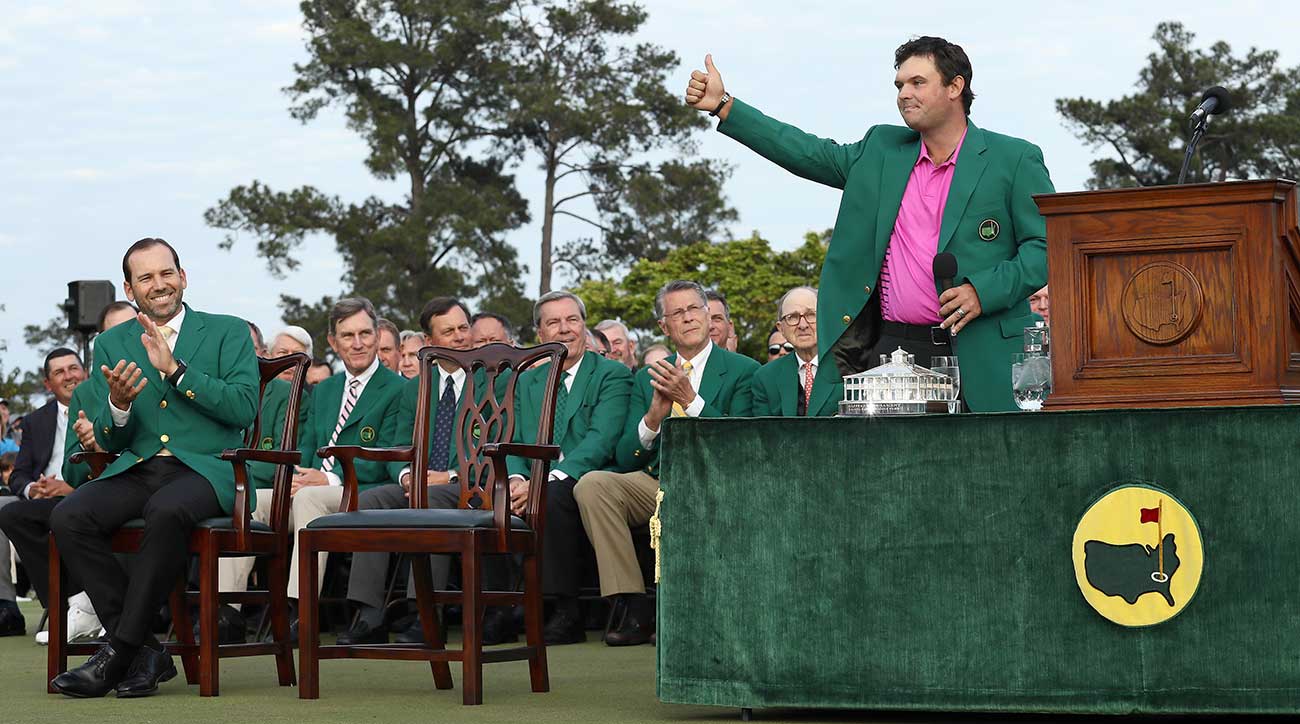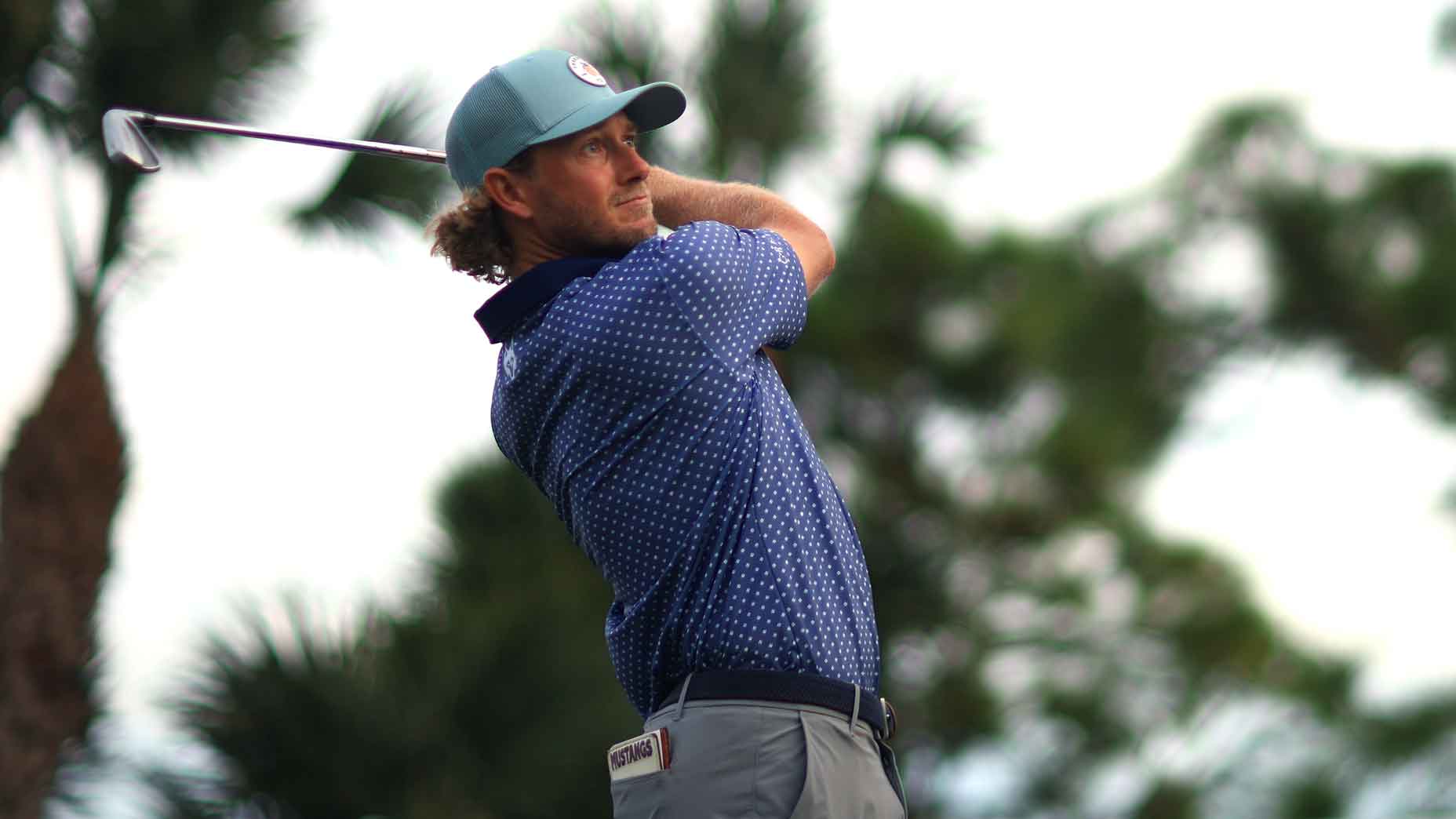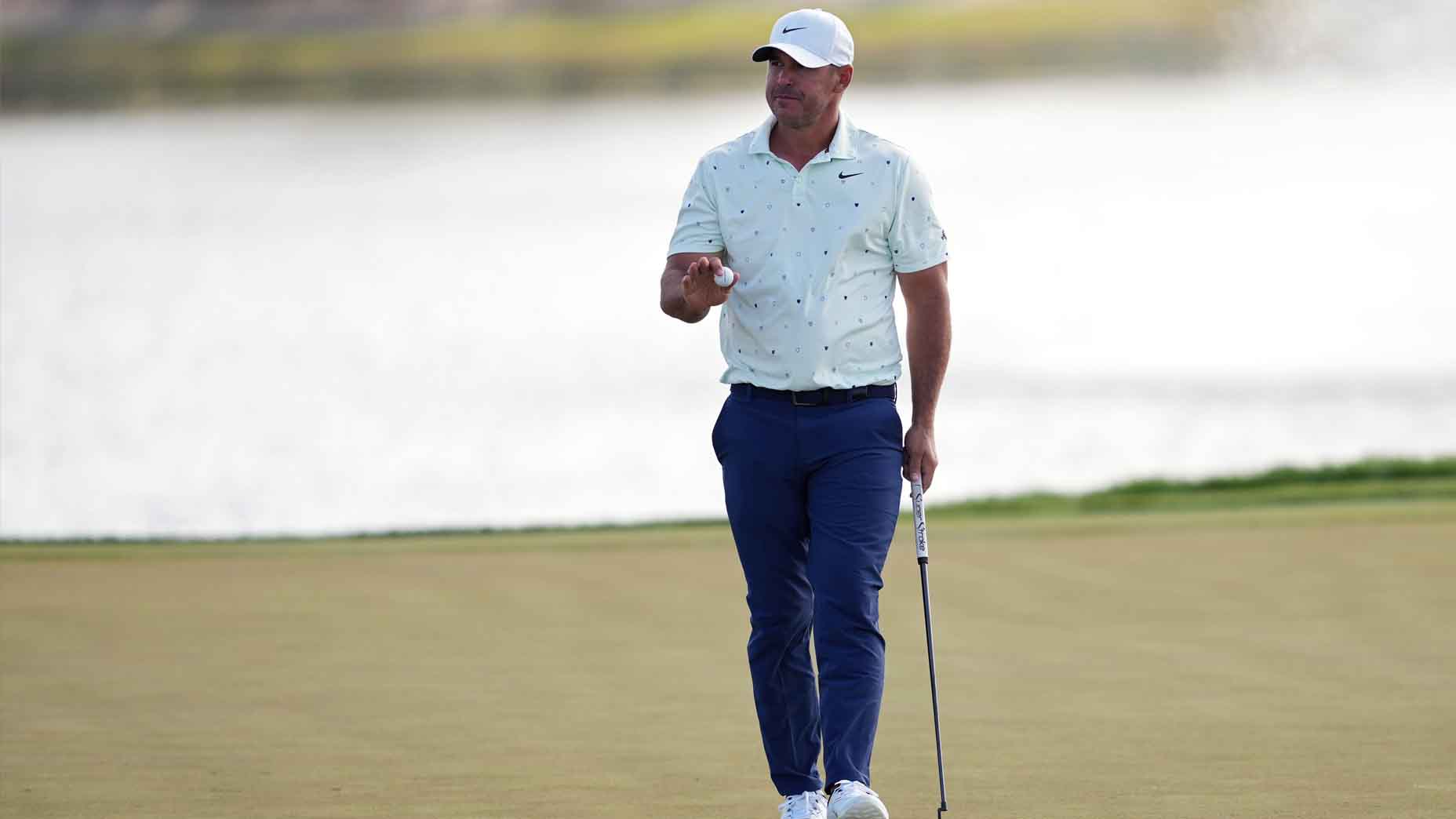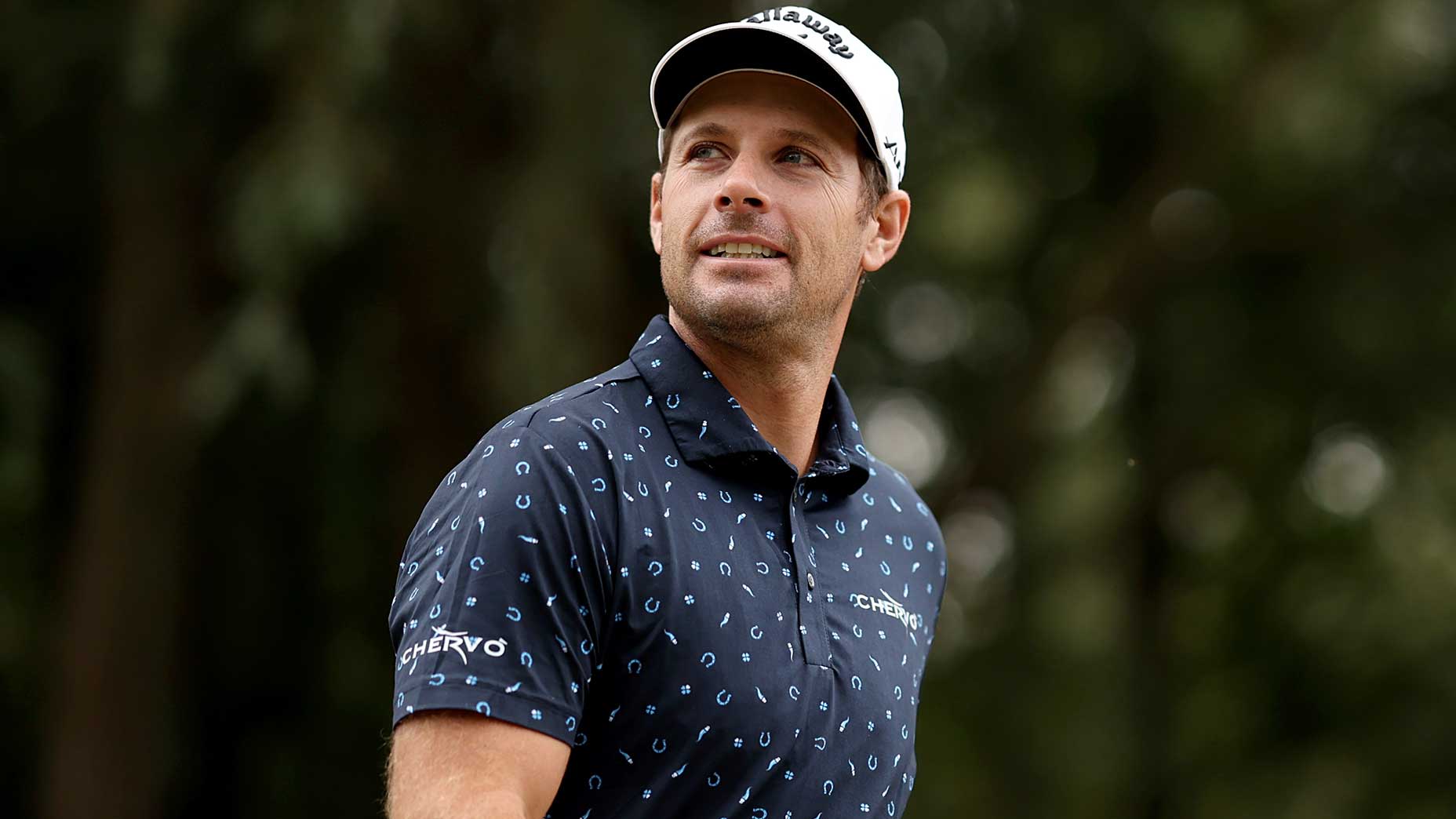I hate asking questions in press conferences.
I almost never do it. If the player says something really funny or enlightening the whole world hears it, too. I always try to wait it out and find a quiet moment alone, when you’re more likely to get a thoughtful answer that no one else has. Anywhere else but the Masters I would have followed Patrick Reed after the champion’s press conference and found a stolen moment to ask the question, but I’m intimately familiar with the Sunday night choreography at Augusta National: directly from the press conference Reed is taken in a cart to Butler Cabin for a little quiet time with his family, then whisked to dinner with the club members, then to the Champions Locker Room to be presented with his new locker, then straight to his car and home.
There are security and green jackets everywhere, likely on high alert in part because of my aggressive maneuvering in years past to crash the party in Butler Cabin or catch the champ walking from there to dinner with the members. There was no way to be sure I could get even 10 seconds with Reed, and I didn’t want to burn three precious hours trying. The question simply had to be asked in the press conference.
There are larger issues surrounding the story that have played out across Twitter and elsewhere. Here’s how it went down: I first reached out to Reed’s mom on Saturday. She wasn’t sure she wanted to talk, which I understood — I woke up on Sunday not sure if I wanted to write the story. Despite evidence to the contrary, I’m not a heartless bastard. I knew the story would be polarizing. I suspected it would complicate what would be the greatest achievement of Reed’s life, and I had some misgivings about that.
I talked it over Sunday morning with a couple of my editors. Their feeling was that Reed’s controversial college career and family dysfunction is integral to understanding who he is, and how he got that way. A bunch of players on the PGA Tour are from Georgia. They had bad experiences with Reed in college, and were not exactly welcoming when he arrived on Tour. He was brash and immature and his reputation quickly metastasized. Already somewhat of a lone wolf, he became even more insular, playing practice rounds alone, with his wife (and later brother-in-law) as his caddie.
The awkward family dynamics became public beginning in 2014 with Ian O’Connor’s ESPN feature, then my 2015 SI story, then Shane Ryan’s brutally illuminating chapter about Reed in his 2015 book Slaying The Tiger. Team Reed grew more cloistered and distrustful of outsiders. Reed did obligatory post-round interviews but little more. Even as he was becoming a Ryder Cup monster and consistent winner he remained a cipher. Based on many comments I got during Masters week, from wired-in Twitter followers and even from other sportswriters, it became more clear to me that a lot of people didn’t really understand Reed’s story, or only knew bits and pieces. After speaking with my editors on Sunday I fully agreed that someone had to write a deep, detailed story about Reed. Given my history with the family from reporting the SI feature, I was the logical choice.

If Reed had won his first major at the U.S. Open would we still have done the article? I’m not sure. But his Augusta roots run deep. Many of the fans on Sunday are locals, or have ties to Augusta. They know the Reeds and have been hearing stories about Patrick going back to when he was at Augusta State, where he feuded with teammates and, as detailed in Ryan’s book, was suspended for two tournaments for a cheating episode. Why was the crowd on Rory’s side on Sunday? And then Jordan’s and Rickie’s, but never Patrick’s? Why was the reaction so muted and weird when he holed the final putt? It’s an Augusta story. For his parents to be exiled a few miles away while their son wins the green jacket is a tale that needed to be told.
Around lunch time on Sunday, Jeannette Reed messaged me to say she and her husband Bill were willing to talk. I hadn’t had an occasion to deal with any of the Reeds in a meaningful way since that 2015 feature and until Sunday afternoon I didn’t know that Jeannette and Bill had never met either of their grandkids. I was also vaguely aware of the warring 2016 Facebook posts between Patrick’s wife and sister but it wasn’t until Sunday that I found them and read them. I interviewed a handful of players after they finished their early Sunday tee times to get more thoughts about Reed. He closed out his victory and I was able to capture all of the emotion at the Reed house. Now the press conference loomed.
Through the years I have criticized Augusta National on any number of issues how Augusta National handles its business, and the few times I have wanted to ask a question in press conferences I have often been ignored by the moderator. It’s irritating, but if that’s how the green jackets want to exact revenge, so be it. (Or maybe I just have a persecution complex?) This time, instead of slumping in the middle of the room, I sat in the front row, where it would be harder to blow me off. My heart sank a little when I saw Craig Heatley would be moderating the champions press conference. He figured in my forensic examination of Tiger Woods’s ill-fated drop at the 2013 Masters, and I was critical of his handling of the club’s public response. I had heard through the grapevine he was hacked off about the story, but we have never discussed it.

When I interviewed Patrick and Justine in 2015 for that SI feature they declined to comment about anything regarding his parents. Fair enough, that’s their prerogative. But it’s Journalism 101 that you need to give both sides a chance to respond for a story. I was writing a different article now, with a lot of fresh thoughts from Reed’s parents, and a lot had happened since my 2015 conversations with Patrick and Justine. My take back then, from the many other interviews I did, was that Patrick got in the middle of a beef between his family and his wife’s people. He obviously sided with Justine and her family.
But it did not seem inconceivable to me that, given the emotion of winning the Masters, Patrick might soften up and have something to say about his parents and sister. I gave a lot of thought to the wording of my question. My intent was not to trick him into saying something controversial, but rather to give him a chance to offer something from the heart. Reed’s stony silence about all the negativity in his life has not served him well. It leads to more conjecture and forces others to tell his story. This has been particularly harmful when it comes to the college cheating accusations, including one dating to his ill-fated freshman year at Georgia. One thoughtful remark about his family on Sunday night could have revealed more of Reed’s humanity, and brought needed context to a complex situation. Sitting in the cavernous press room, waiting for Reed to arrive, I rehearsed my question a couple of times in my mind: Patrick, your Augusta roots run deep. Is it bittersweet to not share this moment with your parents and sister?
The press conference began. I’m not gonna lie, I felt tense. I was afraid Heatley would snub me, and apprehensive about what would happen if he didn’t. The standard practice, once the questions begin, is to raise an index finger to about chin level to get the moderator’s attention. Eventually they make eye contact and offer a few fingers; three of them, for example, means you’re third in line to ask a question. When it’s your turn the moderator will look at you and address you by name. (There are chips in the credentials hanging around our necks that beam information to a screen on the dais, displaying our name, affiliation and seat number. Amazing, I know.) This time I was raising my hand higher than usual, hoping to force Heatley to acknowledge me. He made eye contact a few times and nodded but never came back to me for a question.
I would have been fine with another reporter asking about the family situation, but as the press conference dragged on — it was the most low-energy champion’s presser I’ve been to going back to 1994 — it became clear that no one else was going to address the elephant in the room. I started raising my hand higher and while Reed was answering other questions I never stopped staring at Heatley, trying to engage eye contact. Finally, near the tail end of the presser, he came to me. I got the words out just as I had hoped. Reed gave me a hard stare for a beat or two and said, “I’m just out here to play golf and try to win golf tournaments.”
The emotionless words hung in the air as he was burning a hole through me with his eyes. In that moment it was tempting to break the awkwardness and blurt out a follow-up, but silence is a powerful tool for a reporter. I was hoping Reed would fill it with another thought, but he didn’t. It was not a comfortable moment for either us. Heatley adjourned the press conference and I went back to my spot in the press room to finish typing my story. Reed headed for Butler Cabin to be united with his wife and her family.






